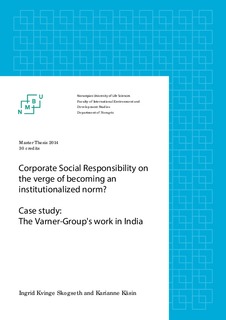| dc.description.abstract | The purpose of this thesis is to illuminate the importance of researching Corporate Social Responsibility (CSR) in International Relations (IR), through a social constructivist
perspective. This is a two-folded study. The first part of the study sets out to investigate the development of CSR as an international norm, and seeks to identify the drivers of CSR as a norm in Norway and India. The second part of the thesis is a case study of the Norwegian
textile company, the Varner-Group. The case study investigates CSR on a practical level
through exploring the Varner-Group’s CSR practices in India. The study applies a qualitative
method and the main approaches made use of, was literature review and interviews. The
literature review consisted of both primary and secondary sources, while the interviews were
conducted both in India and Norway. The respondents mainly consist of representatives from the corporate sector, nongovernmental organizations (NGO) and research institutes. The first part of this study argues that CSR is on the verge of becoming an internationally institutionalized and internalized norm. In order for CSR, as norm, to become fully institutionalized, it needs to venture through all three stages of the Norm Life Cycle Model,
which is presented through a social constructivist perspective. The three stages of the model are norm emergence, norm cascade and norm internalization. The norm consolidation actors, are those recognized as drivers of CSR between the second and third stage of the norm life cycle. The consolidation around the third stage of the CSR norm life cycle is evident through the implementation of CSR in state legislations such as in Norway and India. In 2013, CSR reporting was implemented in the Norwegian accounting law, while in India the Companies, Act 2013, demands companies of a certain size to spend two percent of their surplus on CSR
purposes.
The case study investigates how Norwegian companies, on a practical level, conduct CSR.
The study argues that the Varner-Group’s CSR work has evolved in accordance with the
norm development of CSR, since the company created a CSR department in 2003.
Furthermore, the study identifies several challenges the Varner-Group faces through their operations in India. The challenges include countering the societal issues, a different business culture and CSR traditions. Finally, the study places the company in the Economic/Ethical segment of the Three-Domain Model of CSR. This model shows the grounds by which the Varner-Group bases their business strategies in relations to CSR. | nb_NO |

